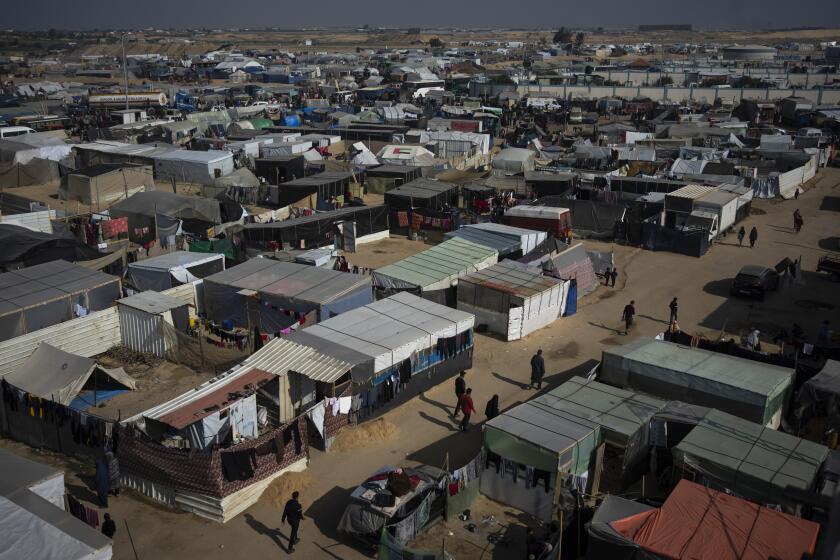Soviet Premier Calls for 60% Hike in Prices
Soviet Prime Minister Valentin S. Pavlov on Monday proposed price increases averaging 60% on food and most consumer goods for the first time since World War II.
“There will be fixed prices set by the state for staples and vital commodities, and they will be allowed to grow under tight controls imposed by the state,” Pavlov told Soviet legislators at the opening of a new session of the Supreme Soviet, the national legislature.
Although state-set price ceilings will govern prices for basic goods--like meat, milk, flour, bread and sugar--prices will be freed on 30% of all retail goods, including leather shoes, refrigerators, washing machines and candy.
The price hikes, however, will be compensated, Pavlov said, by substantial aid payments to wage earners, conscripts, pensioners, students and families with children. These compensations would offset 85% of the price increases, he contended.
The proposals, which need parliamentary approval, have apparently been endorsed by President Mikhail S. Gorbachev, who appointed Pavlov to his post last month.
It was not clear when the increases would take effect. The government has been struggling with how to raise prices since September, 1987, and rumors of price hikes last year sparked widespread panic buying.
The measure was an attempt to bring prices closer to the “real cost of production,” the prime minister said, without lowering people’s living standards.
Price hikes are especially mindboggling for Soviet consumers because prices on most goods have been constant since World War II. Former dictator Josef Stalin actually lowered prices on some goods from 1948 to 1954.
Prices have been so stable that state prices are printed, etched or stamped on many goods. If you buy a Soviet-made push-button telephone, for example, the price, 65 rubles, is scratched into the plastic base.
Consumers often differentiate between qualities or types of goods by their price. When ordering a cream-covered ice cream bar, for instance, many people just ask for a “28,” its price in kopecks.
Pavlov said that nationwide price hikes were necessary because the republics were misappropriating money earmarked for food subsidies.
“I can say only that the money, 229 billion rubles in all ($140 billion at the inflated official commercial rate), earmarked for consumer goods subsidies, has been spent on different things in a number of regions and republics,” Pavlov said. “In Russia, for instance, there should be 116 billion rubles ($71 billion) for this purpose, but the republic’s budget provides only 69.7 billion rubles ($42.6 billion).”
Another reason increases in retail prices are necessary, economists here contend, is that since wholesale prices were increased last year, factories have been stockpiling their output rather than selling the products at less than cost.
“Production costs increased threefold, while retail prices remained unchanged,” Anatoly Chubais, a Leningrad economist, told the independent PostFactum news service. “Marketing a saucepan means sustaining losses of 30 to 40 rubles ($18 to $24).”
Pavlov said he disagreed with a recent proposal made by Russia, Byelorussia and the Ukraine that envisioned the national government’s setting retail prices, with the amount of compensation being left to the discretion of leaders of the republics.
If prices are the same across the country, Pavlov said, compensation should also be the same. He allowed, however, that prices may be higher in Moscow than they are in the region where the product was produced, but both would have to be lower than the ceiling set by the government.
Some radical reformers were incredulous when they heard Pavlov’s plan, but it was not nearly as extreme as expected.
Leningrad Mayor Anatoly A. Sobchak, who was visibly exasperated with Pavlov’s proposal, said the prime minister’s speech reminded him of a skit by popular comedian Gennady Khozanov, who mimics half-wits.
“All that he was saying completely disagrees with reality,” Sobchak said during a break in the Kremlin session.
Edward Hewett, a senior fellow at the Brookings Institution in Washington, D.C., said the measures will not move the country toward a market system or improve the Soviet economy.
“The compensations will probably turn out to be too big,” Hewett, an expert on the Soviet economy, said in a telephone interview. “In a system where there’s too much money, when you raise prices and add compensations, you get inflation. This is not going to take care of the excess amount of money floating around in the system.”
Pavlov’s proposals are also likely to be criticized by Russian President Boris N. Yeltsin, but a Yeltsin spokesman said the leader of the largest republic in the Soviet Union, who is scheduled to make a televised speech today, had no immediate comment.
Prices on luxury goods, which were increased in November, will not be raised again, according to Pavlov’s plan. Prices will also remain stable on some other goods, including coffee and gasoline.
When legislators reacted loudly to Pavlov’s statement that vodka prices would not go up, he explained that increasing the price of vodka would be harmful because it would encourage people to make moonshine.
Pavlov’s speech was the highlight of the first day of the Supreme Soviet’s four-month session, during which lawmakers are expected to debate major economic reform legislation, a treaty on the unification of Germany and an emigration law. Lawmakers are expected to grill Pavlov today on the proposed price increases.
More to Read
Sign up for Essential California
The most important California stories and recommendations in your inbox every morning.
You may occasionally receive promotional content from the Los Angeles Times.






